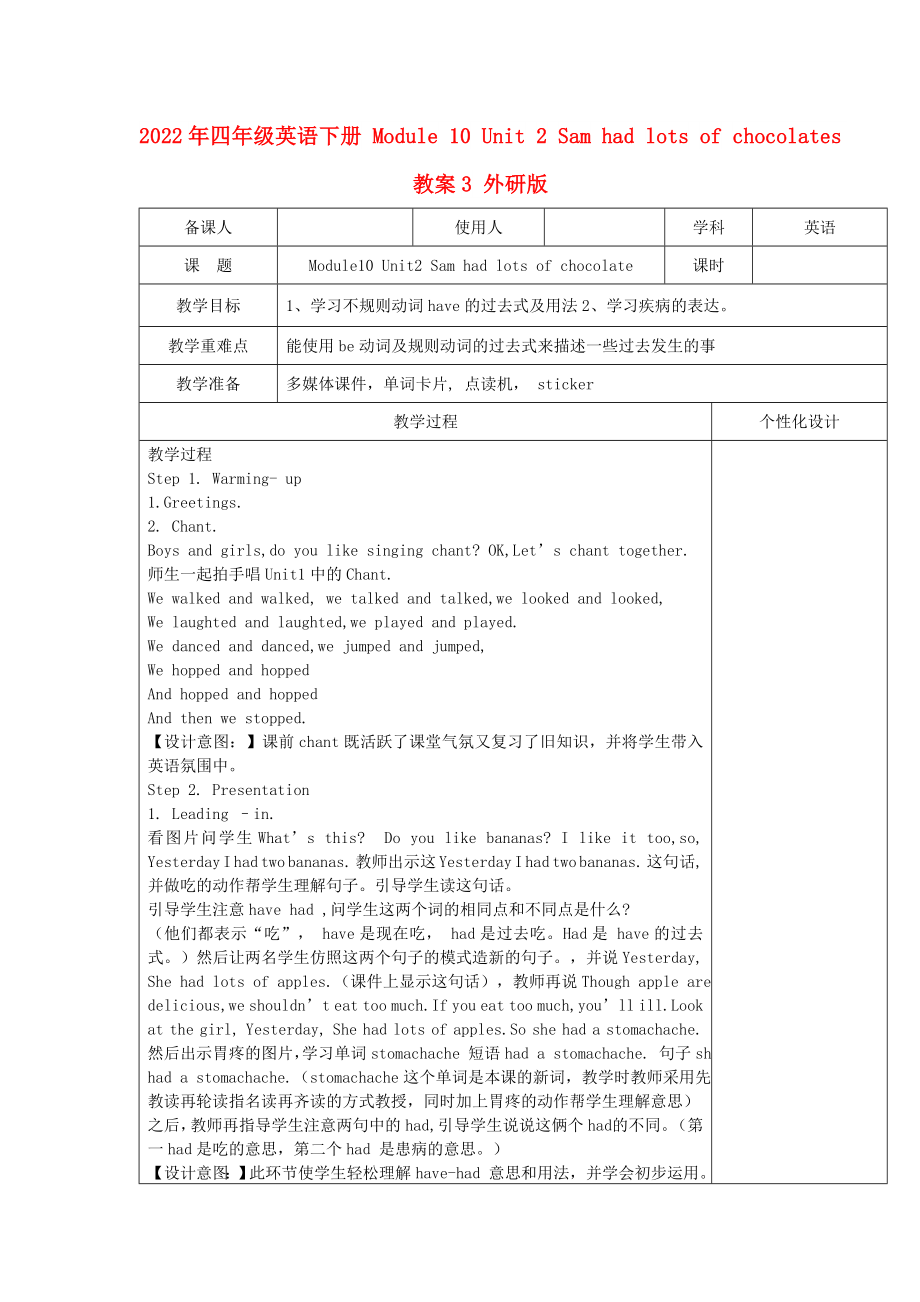《2022年四年級(jí)英語下冊(cè) Module 10 Unit 2 Sam had lots of chocolates教案3 外研版》由會(huì)員分享,可在線閱讀��,更多相關(guān)《2022年四年級(jí)英語下冊(cè) Module 10 Unit 2 Sam had lots of chocolates教案3 外研版(3頁珍藏版)》請(qǐng)?jiān)谘b配圖網(wǎng)上搜索���。
1��、2022年四年級(jí)英語下冊(cè) Module 10 Unit 2 Sam had lots of chocolates教案3 外研版
備課人
使用人
學(xué)科
英語
課 題
Module10 Unit2 Sam had lots of chocolate
課時(shí)
教學(xué)目標(biāo)
1、學(xué)習(xí)不規(guī)則動(dòng)詞have的過去式及用法2�、學(xué)習(xí)疾病的表達(dá)。
教學(xué)重難點(diǎn)
能使用be動(dòng)詞及規(guī)則動(dòng)詞的過去式來描述一些過去發(fā)生的事
教學(xué)準(zhǔn)備
多媒體課件��,單詞卡片, 點(diǎn)讀機(jī)�����, sticker
教學(xué)過程
個(gè)性化設(shè)計(jì)
教學(xué)過程
Step 1. Warming- up
1.Greetings.
2�����、
2. Chant.
Boys and girls,do you like singing chant? OK,Let’s chant together.
師生一起拍手唱Unit1中的Chant.
We walked and walked, we talked and talked,we looked and looked,
We laughted and laughted,we played and played.
We danced and danced,we jumped and jumped,
We hopped and hopped
And hopped and ho
3��、pped
And then we stopped.
【設(shè)計(jì)意圖:】課前chant既活躍了課堂氣氛又復(fù)習(xí)了舊知識(shí),并將學(xué)生帶入英語氛圍中���。
Step 2. Presentation
1. Leading –in.
看圖片問學(xué)生What’s this? Do you like bananas? I like it too,so, Yesterday I had two bananas. 教師出示這 Yesterday I had two bananas. 這句話, 并做吃的動(dòng)作幫學(xué)生理解句子��。引導(dǎo)學(xué)生讀這句話����。
引導(dǎo)學(xué)生注意have had ,問學(xué)生這兩個(gè)詞的相同點(diǎn)和不同點(diǎn)是什么
4�、?
(他們都表示“吃”, have是現(xiàn)在吃��, had是過去吃�����。Had是 have的過去式�。)然后讓兩名學(xué)生仿照這兩個(gè)句子的模式造新的句子。�,并說Yesterday, She had lots of apples.(課件上顯示這句話),教師再說Though apple are delicious,we shouldn’t eat too much.If you eat too much,you’ll ill.Look at the girl, Yesterday, She had lots of apples.So she had a stomachache. 然后出示胃疼的圖片����,學(xué)習(xí)單詞st
5、omachache 短語had a stomachache. 句子she had a stomachache.(stomachache這個(gè)單詞是本課的新詞����,教學(xué)時(shí)教師采用先教讀再輪讀指名讀再齊讀的方式教授�����,同時(shí)加上胃疼的動(dòng)作幫學(xué)生理解意思)
之后����,教師再指導(dǎo)學(xué)生注意兩句中的had,引導(dǎo)學(xué)生說說這倆個(gè)had 的不同���。(第一had是吃的意思���,第二個(gè)had 是患病的意思。)
【設(shè)計(jì)意圖:】此環(huán)節(jié)使學(xué)生輕松理解have-had 意思和用法�����,并學(xué)會(huì)初步運(yùn)用��。
2. New words.
This class we’ll learn some other words about ill. Look
6���、 at these pictures.( 教師依次出示感冒,發(fā)燒��,頭疼的圖學(xué)習(xí)單詞cold fever headache及短語had a cold/ fever/ headache, 學(xué)習(xí)這些單詞的流程同stomachache。)
學(xué)完這四個(gè)新單詞后�,教師再次快速展示這四幅圖,看誰能又快又準(zhǔn)的說出單詞����。
之后教師和學(xué)生一起chant.
Today, today, I have apples.
Yesterday,yesterday, Mum had bananas.
Cold cold , Tiger had a cold.
Fever f
7、ever, Monkey had a fever.
Headache,headache, Dog had a headache.
Stomachache,stomachache,
Little pig had a stomachache
【設(shè)計(jì)意圖:】通過先教讀再輪讀指名讀再齊讀的教授方式教師能全面了解學(xué)生的發(fā)音����。加動(dòng)作讀單詞能幫助理解句子的意思。學(xué)生在chant中又重新復(fù)習(xí)了have-had和新學(xué)的單詞����。
3. New text.
1、一聽課文�����。
Sam Daming Amy and Lingling are ill (生病)today. Listen and ci
8�����、rcle the answers.What’s the matter with them today?(他們到底怎么了)
幻燈片出示問題答案��。Today he’s got a stomachache . Today he’s got a stomachache. Today she’s got a headache. Today she’s got a fever .
2、再聽課文
Listen and circle the answer�����,What happened to Sam Daming Amy and Lingling yesterday? (昨天他們?cè)趺戳?)
幻燈片出
9����、示問題答案。Sam had lots of chocolate biscuits yesterday. Daming had two watermelons yesterday. Amy had a cold yesterday. Lingling had a headache yesterday.
【設(shè)計(jì)意圖:】帶問題聽課文能增強(qiáng)學(xué)生的學(xué)習(xí)興趣����。使聽更有目的性。
3�、Listen and say.
【設(shè)計(jì)意圖:】 跟讀磁帶能培養(yǎng)學(xué)生正確的發(fā)音和語感。
4����、看圖說句子
出示本課的課本圖片,讓學(xué)生說出學(xué)過的句子�����。
【設(shè)計(jì)意圖:】 檢查背課文是學(xué)生很厭倦的事����,以這種方式檢查學(xué)生句子
10���、的掌握情況���,學(xué)生很喜歡����。
5����、填空
1.Daming had two watermelons yesterday,( )today he’s got a stomachache.
2.Amy had a cold yesterday,( ) today she’s got a headache.
【設(shè)計(jì)意圖:】 這個(gè)練習(xí)提醒學(xué)生注意關(guān)聯(lián)詞的使用。����。
Step 3: Practice
用Yesterday I…, and today I…
Yesterday I…, so today I…編故事。
【設(shè)計(jì)意圖:】編故事是學(xué)生非常喜愛的活動(dòng)��。在學(xué)生理解課文后���,教師可引導(dǎo)學(xué)生發(fā)揮豐富的想象力�,描述發(fā)生事情的及原因��,然后將其編成合理的故事�。
Step 4: Summary
讓學(xué)生總結(jié)學(xué)到的知識(shí)。
【設(shè)計(jì)意圖:】學(xué)生對(duì)這節(jié)課學(xué)到了什么做到心中有數(shù)。
Step 5: Homework
1.An apple a day keeps the doctor away.每天一個(gè)蘋果 醫(yī)生將會(huì)遠(yuǎn)離你����。
2.Listen and read Unit1 5 times,then remember.
【設(shè)計(jì)意圖:】教師的忠告提醒學(xué)生注意飲食健康。在低年級(jí)英語教學(xué)中讀被課文是很重要的�����。
板書設(shè)計(jì)
教學(xué)后記:
 2022年四年級(jí)英語下冊(cè) Module 10 Unit 2 Sam had lots of chocolates教案3 外研版
2022年四年級(jí)英語下冊(cè) Module 10 Unit 2 Sam had lots of chocolates教案3 外研版

